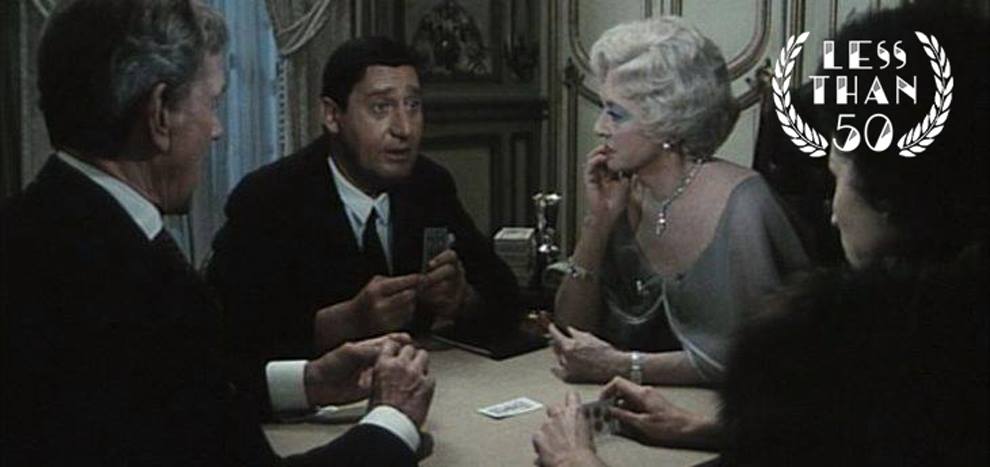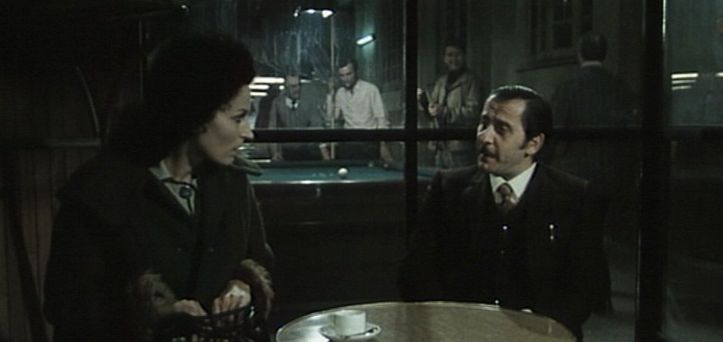In our new column, Less Than (Five) Zero, we take a look at films that have received less than 50 logged watches on Letterboxd, aiming to discover hidden gems in independent and world cinema. In this instalment, Brad Mariano looks at a classic from underrated Italian director Luigi Comencini, Lo Scopone Scientifico (The Scientific Cardplayer, 1972).
Date Watched: 2nd October, 2014
Letterboxd Views (at the time of viewing): 23
I’ve always had an affinity for Italian cinema, but one that until recently only probed as far as the broad Western canon does, which is to say, not much further than Neorealists Vittorio De Sica and Roberto Rossellini and the arthouse milieu of Fellini, Antonioni, Visconti, Pasolini and Bertolucci, the key names of Italy’s rich contribution to the European arthouse heyday of the 1960s. But recently I’ve had an interest in other fields of Italian cinema, culturally significant in the national cinema but less noted by the highbrows and traditional narratives of the development of World Cinema. And thought I’ve got massive viewing gaps to fill in – Italian genre film is a niche you could spend a lifetime in – one which has interested me is the commedia all’italiana, an interest bolstered by the recent retrospective at Melbourne International Film Festival, coinciding with the general shift as some of these films and filmmakers are slowly gaining some notice. 1.
A particularly interesting cultural document I’ve been using as reference is a list compiled recently entitled 100 film italiani da salvere – roughly “100 Italian Films to Be Saved,” which seeks to list the 100 most culturally significant Italian films between the years 1942 and 1978, roughly correlating to the years commonly accepted as the golden years of Italian cinema.2 With three films listed (including Scopone), as many as Antonioni or Pasolini, was Luigi Comencini, someone who is clearly a major figure in the national cinema – his production of Pinocchio, a television miniseries that also was edited into a shorter, theatrical version, was the most expensive TV production ever made in Italy at the time, as well as perhaps still the most critically acclaimed (and which came out the same year as this film, testimony to just how prolific some of these directors were) and his 1953 film Pane, Amore e Fantasia was one of the films that kicked off the commedia all’italiana as well as the career of Gina Lollobrigida. However, Comencini is a director all but completely overlooked in the West. As illustration, every single film of his would qualify for this column, and there isn’t a single English-language review for any of his films on Letterboxd. Time to get to work. But that only gets me half there – what sold me on this film in particular was its delicious premise and intriguing cast (and this film’s accessibility – thanks to Madman we seem to be the only country with the film is available on English-friendly DVD).
A poor couple, Peppino and Antonina (Alberto Sordi and Silvana Mangano) live in a shanty town on the outskirts of Rome, barely able to feed their five children. Their neighbours are no better off. Like a darkly comic hangover from neorealism, there are some great touches in establishing the community, such as Peppino’s youngest son shaving the beard of a corpse at a funeral home, as the owner would have had to pay a barber much more. All in all, things look grim, but not without the faintest glimmer of hope – once a year an aging, nameless millionairess (Bette Davis (!)) comes to Rome accompanied by her chauffeur (Joseph Cotton (!!)) to play the couple in a game of scopone, an Italian card game. She fronts them the buy-in money of one million lira, as she has for eight years, giving them everything to win and (seemingly) nothing to lose. But every year she defeats them, crushing their dreams and snatching their prospects for a better life right out from under their noses, and continues her travels. We see a scrapbook of her doing the same to impoverished couples in the Philippines, India and all around the world. It becomes a yearly tradition that the entire community comes to await, as Peppino has promised each person something from his eventual winnings.
Already, the rough economic ideas that run through the film are quite clearly set out – like a vast majority of twentieth century Italian directors and intellectuals, Comencini at least flirted with Marxism as a framework to understand the deep economic rifts and divisions – connected with geographical ones –3 that came to define the varied fortunes of Italy following the war, especially in light of the growing industrialisation and middle class in northern regions, and these tensions are crucial in understanding the majority of Italian films that come out in this period. So this film proceeds along these lines – Davis’ character appears something like a cross between ruthless, card-playing colonialist and patron saint in Italy, who appears once a year offering great fortune, but when we start playing the games of scopone, we see the cogs of capitalism setting the cycles in place as the film’s fatalism comes to the surface.
As the film proceeds, Peppino and Antonina begin winning, but in a Kafkaesque cycle keep playing on as Davis’ character “la vecchia”’s kind exterior deteriorates with her health into exposing her competitive streak, and as it is hinted toward the end, something altogether more sinister. Our protagonists continually win, but through a variety of means are coerced into an endless procession or double-or-nothing stakes – the catch being that the fortune of la vecchia is near limitless, meaning that she can never really lose, and eventually Peppino and Antonina will make a mistake and lose everything. The film becomes a tremendously suspenseful and riveting one through their card games, and Comencini shoots the different players making expressions and looks across the table, so that even though the exact rules of the game still mystify me (I was lost as soon as they said they were using a 40 card deck) there’s a clarity to the increasingly desperate games that makes it really fun viewing. It really captures feel of the increasing stakes, and fleshing out the greed of Peppino and Antonina as a manifestation of their personal problems – Peppino needs money to free his sister from being forced into prostitution by her husband, to assert his masculinity with the re-appearance of Antonina’s old flame (a cunning card shark) but also within the context of his community as a makeshift collectivised group – the decision to keep his initial winnings or to play on is one that the whole town comes together to decide, as most people some way or the other have a vested interest in the game. Comencini’s approach to these scenes is interesting – there’s a very Italian sense of joy and vitality to these crowd scenes in the village that are sharply contrasted with the opulent but sparse and imposing chateau where the games are played; there’s clearly something that the millionairess is missing out on, but the scenes in the town often feel invasive and claustrophobic, full of scenes of neighbours poking their heads through windows, gossip and general unhelpfulness of these relations as well.
Down to the hilarious and ambiguous conclusion, this is a really solid film, remarkably well paced and all in all a superior commedia all’italiana effort. I’d be remiss not to mention the primary reason this film is still remembered, of the legendary anecdote that Bette Davis called Alberto Sordi “Alberto Sordid” because he treated her awfully and refused to speak to her in English, but hopefully it becomes a bit more well known for its obvious merits. Davis is fantastic, her grotesque make-up and isolation recall her iconic role in What Ever Happened to Baby Jane? but her motives and character become one of the lasting impressions and mysteries of the film. Joseph Cotton probably doesn’t have enough to do here, but he provides some interesting backstory and his own complicity in the proceedings does tease some interesting ideas. It’s unquestionably Sordi’s film, however, and the great tragicomic actor delivers laughs and pity in volumes. Depressing, funny and with a lot to chew on after the film’s ending, Lo Scopone Scientifico was a really enjoyable and valuable discovery, and not the last of Comencini films I’ll seek out.


